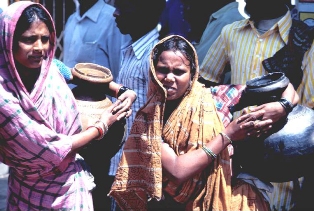Housewives are face of HIV in India
November - December, 2008 | Volume 7, Issue 6

Photo: World Bank
HIV incidence in Chennai, India, is highest among a surprising
demographic slice, says AIDS pioneer Dr. Suniti Solomon.
From a scientific hunch and a series of small Fogarty grants, Dr. Suniti Solomon has become one of India's leading figures in AIDS research, prevention and treatment.
Speaking recently to Fogarty scientists, she said India's culture, which at first refused to believe her findings in 1986 that AIDS had come to the subcontinent, still stigmatizes patients so much that a majority of infected people avoid community hospitals and seek private treatment instead.
That, she says, is why more emphasis should be put on training care givers in the private sector.
Cultural norms also are responsible for the fact that nearly one-quarter of HIV-positive clients at her center are "housewives. Not sex workers, not truckers."
Prevalence is so high among housewives because husbands have multiple partners and marry despite knowledge of their HIV status, she said.
"The needs of patients are not just medical, especially in a country like India with all the culture (barriers)," Solomon said, explaining why her center engages in marriage counseling among HIV-positive couples.
Trained as a microbiologist, Solomon began reading journal articles in the mid-1980s about the spread of HIV in North America, Europe and Africa and thought, "If it's come there, it must have come to India." As a government doctor in Chennai in 1986, Solomon took advantage of the local police practice of rounding up prostitutes on a regular basis. She went at 6 a.m. one day to the prison, and drew blood from about 100.
When six of the samples showed positive for HIV, she had them reviewed and then sent them to Dr. Thomas Quinn, a Fogarty grantee at Johns Hopkins University, for confirmation. She said the result was denial by Indian government officials that there were homosexual men or drug users.
Eventually, she opened the Y.R. Gaitonde Centre for AIDS Research and Education, which Fogarty program officer Thomas C. Mampilly calls “one of the most successful research institutions in all of India.”
Since that first hunch two decades ago, Solomon, a Fogarty partner in the AIDS Training and Research Project in southern India, credits the Center with not only setting her on a successful research path but enabling her to leverage early grants into large contributions from the private sector, as well as from NIMH and NIAID.
To view Adobe PDF files,
download current, free accessible plug-ins from Adobe's website.
Related World Regions / Countries
Related Global Health Research Topics